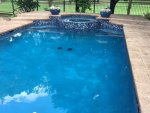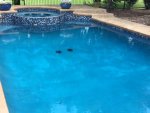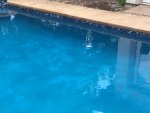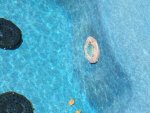We recently resurfaced pool with a quartz finish -- at end of start-up, there was significant splotchiness/discoloration that the pool company was reluctant to acknowledge. We brought in a 3rd party inspector to provide us an evaluation -- and his report indicated significant issues with the pool start up (they did a hot start) and recent attempts to remedy the discolored areas have produced corrosive water. When inspector did chemistry, the calcium was over 500, alkalinity 0, ph <7. He indicated that the corrosive nature of the water is causing calcium to leach out of the plaster (you can see clouds in water if you rub hand against the surface and can also see quartz falling out). He cautioned that this water could cause loss of pigment, damage to lights (they have copper color coating on them), damage to heater and finish may not last as long. His recommendation is to drain and try to polish plaster to remove loose quartz. if plaster is too weak to do that, it should be replastered.
the pool company disputes the claims of the inspector. Their recommendation was an acid bath and sending a diver down to work on the areas where there are patches of cream on the surface. They only acknowledge the cosmetic issues -- they have so far ignored the inspectors findings related to the damage caused by the corrosive water.
the plaster company representative claims the inspector has a personal issue with them and is therefore not being honest in his report. We have no idea who to believe or how to determine what the appropriate path forward is. We would never have known there were larger issues with the surface had it not been for the inspector. all we saw were the very obvious blemishes in the plaster, which seem to have gotten worse.
How do know who's right and find the best path forward?
the pool company disputes the claims of the inspector. Their recommendation was an acid bath and sending a diver down to work on the areas where there are patches of cream on the surface. They only acknowledge the cosmetic issues -- they have so far ignored the inspectors findings related to the damage caused by the corrosive water.
the plaster company representative claims the inspector has a personal issue with them and is therefore not being honest in his report. We have no idea who to believe or how to determine what the appropriate path forward is. We would never have known there were larger issues with the surface had it not been for the inspector. all we saw were the very obvious blemishes in the plaster, which seem to have gotten worse.
How do know who's right and find the best path forward?







